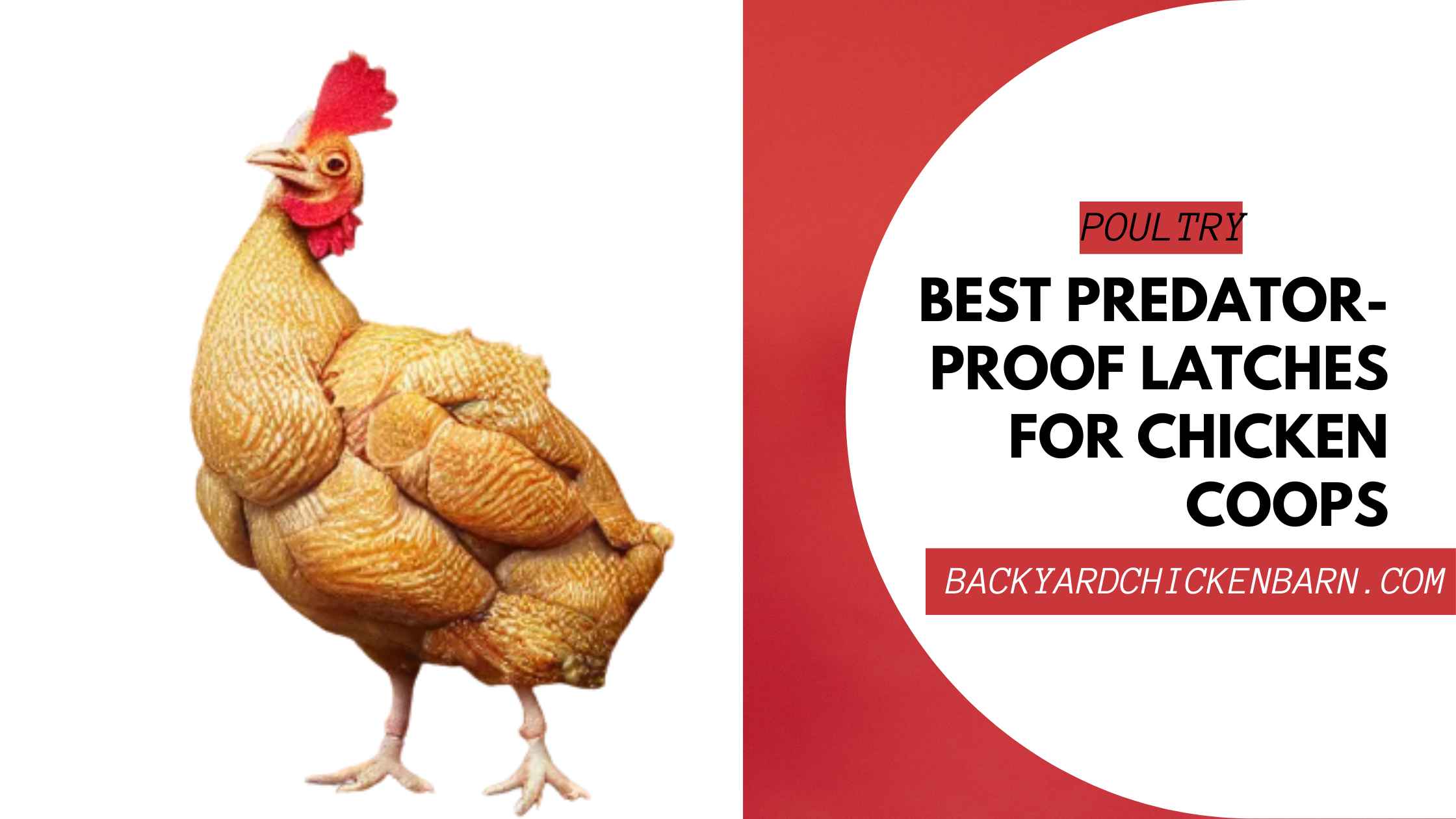The Best Predator-Proof Latches for Chicken Coops
Keeping your chickens safe from potential predators is a top priority for every chicken keeper.
One of the weakest points in many coops, and thus a favorite entry point for many predators, is the door latch. Ensuring you have a predator-proof latch is essential.
Here’s a look at some of the best latches to keep your feathery friends safe:
1. Two-Step Locking Latches:
- Overview: This type of latch requires two separate actions to open. Predators like raccoons, often called “nature’s locksmiths,” can be incredibly adept at opening simple latches. A two-step latch often confuses or deters them.
- Pros: Simple to install and use, widely available, deters a variety of predators.
- Cons: Some may be made of cheaper materials that can rust or deteriorate over time.
2. Padlock and Hasp:
- Overview: A padlock and hasp combination is a robust deterrent. By using a padlock, you add an additional level of security that most predators cannot bypass.
- Pros: Highly secure, especially if you opt for a rust-resistant or weatherproof padlock.
- Cons: Requires a key, which can be misplaced. Some may find it inconvenient to use daily.
3. Sliding Bolt Latches with Carabiner or Lock:
- Overview: Sliding bolt latches are common on coops. When combined with a carabiner or small lock, they become a formidable barrier against predators.
- Pros: Easy to install and use. When combined with a carabiner, it offers quick access but remains secure.
- Cons: The sliding bolt itself can be manipulated by some predators if not locked.
4. Twist Latches:
- Overview: Twist latches require a twisting motion to unlock, followed by a pull or push action.
- Pros: Difficult for most predators to open due to the required motion. Durable and rust-resistant models are available.
- Cons: Some cheaper models might not withstand the force from larger predators.
5. Automatic Door Closers with Integrated Latches:
- Overview: These systems automatically close the coop door at a preset time or light level, integrating a secure latching mechanism.
- Pros: Automates the process of securing your chickens, ensuring they are safe even if you forget to close the coop. Many models come with predator-resistant latches.
- Cons: More expensive than simple latches. Requires power, usually from batteries or a solar panel.
6. Barrel Bolt Latch:
- Overview: A barrel bolt requires a slide action, making it difficult for most predators.
- Pros: Affordable, easy to install, and offers decent security against a variety of predators.
- Cons: Can be manipulated by smarter predators like raccoons if not combined with another form of security.
Conclusion:
The ideal latch often depends on the specific predators in your area and your coop’s design. In areas with a high raccoon population, a two-step locking latch or a sliding bolt with a carabiner might be ideal.
For those in more urban settings, a padlock and hasp or an automatic door closer might be more appropriate. Regardless of your choice, regular inspections and maintenance of the latch are crucial to ensure its effectiveness over time.
Remember, a secure latch is a primary line of defense between your chickens and potential threats.
ALSO SEE: Solway Chicken Coop Reviews

FAQs: Best Predator-Proof Latches for Chicken Coops
- What predators are known to open chicken coop latches?
- Answer: Raccoons are the most infamous for their dexterity in opening latches, but some other predators like foxes and opossums might attempt it as well.
- How often should I inspect my coop’s latches?
- Answer: It’s a good practice to inspect your latches weekly for any signs of wear, damage, or tampering.
- Can a simple carabiner deter predators?
- Answer: Yes, a carabiner can be a simple and effective deterrent for many predators when added to a latch.
- Are electronic or automatic coop doors worth the investment?
- Answer: For many chicken keepers, the convenience and added security of an automatic door are worth the investment, especially in areas with a high predator presence.
- Can a determined predator break through a padlocked coop?
- Answer: While a padlock will deter most predators, extremely determined ones like bears (in rare cases) might break through other coop structures.
- How can I tell if a predator has tried to tamper with my coop latch?
- Answer: Look for scratch marks, damaged or bent latches, or nearby tracks.
- Is rust on my latch a concern?
- Answer: Yes, rust can weaken a latch over time, making it easier for a predator to break.
- Do automatic coop doors close even if a chicken is in the way?
- Answer: Most models have safety features to prevent closing on a chicken, but always refer to the manufacturer’s instructions.
- How can I make my existing latch more predator-resistant?
- Answer: Adding a secondary lock, like a carabiner, or reinforcing it with a padlock can enhance its security.
- What materials are best for durable coop latches?
- Answer: Stainless steel and galvanized steel latches are ideal due to their strength and resistance to rust.
- Can I DIY a predator-proof latch?
- Answer: Yes, many chicken keepers create their own latches. Ensure it requires multiple actions to open and is robust.
- Do I need multiple latches on my coop door?
- Answer: While one strong latch might suffice, having two can act as an added deterrent and safety measure.
- How do I protect the coop windows from predators?
- Answer: Use strong mesh or hardware cloth, and consider adding latches or locks to any opening windows.
- What is a two-step locking latch?
- Answer: It’s a latch that requires two distinct actions to open, making it harder for predators to figure out.
- Can predators like snakes enter through small gaps?
- Answer: Yes, smaller predators like snakes can enter through gaps, so ensure all entry points, not just the main door, are secured.
- Are vertical sliding doors more secure than horizontal ones?
- Answer: The direction of the door slide doesn’t necessarily determine security. Instead, the strength and type of latch used are more critical.
- Is it worth upgrading my latch even if I haven’t had predator issues?
- Answer: Prevention is always better than dealing with a tragedy. Upgrading before an issue arises can save future heartache.
- Can I use a bike lock for my chicken coop?
- Answer: While unconventional, a bike lock can provide an additional layer of security, especially cable or U-locks.
- How do I ensure my coop’s latch is childproof?
- Answer: Consider latches that require keys or combinations, and always supervise children around the coop.
- Do digital or combination locks work well for coops?
- Answer: They can offer security, but consider the weather resistance and battery life of digital locks.
- Can I use motion-activated lights to deter predators?
- Answer: Yes, sudden lights can startle and deter many nocturnal predators.
- Do alarms work in deterring predators?
- Answer: While they might scare off some predators, the primary function of an alarm would be to alert you to potential threats.
- How do I keep my latch from freezing in winter?
- Answer: Use silicone or graphite lubricants, and consider a protective cover.
- Are magnetic latches secure?
- Answer: While they might offer some security against smaller pests, they’re generally not recommended as the primary latch against larger predators.
- Can a dog or cat accidentally open standard latches?
- Answer: Some curious pets might, so always opt for a latch that’s both pet and predator-proof.
- What is a barrel bolt latch?
- Answer: It’s a type of latch where a cylindrical bolt slides into a socket. They are straightforward but effective when combined with another deterrent.
- Are twist latches resistant to rust?
- Answer: It depends on the material. Opt for rust-resistant metals like stainless or galvanized steel.
- What if a predator tries to dig under the coop?
- Answer: Bury hardware cloth or mesh at least 12 inches deep around the perimeter of the coop to deter digging.
- How often should I replace my coop’s latch?
- Answer: If there are signs of wear, damage, or rust, it’s time for a replacement. Otherwise, a yearly inspection should suffice.
- Is weight an indicator of latch strength?
- Answer: Not necessarily. While heavier latches might feel more durable, the design and material are more indicative of strength.
- Can a raccoon open a padlock?
- Answer: While raccoons are dexterous, a standard padlock is generally beyond their capability to open.
- Should I consider the coop’s location when choosing a latch?
- Answer: Absolutely. A coop closer to the woods or wild areas might face more predator threats and require a more robust latch.
- Can I use a car door latch for my coop?
- Answer: While unconventional, if securely installed and locked, it can be an effective barrier against predators.
- Are there any predator deterrents to complement my latch?
- Answer: Motion-activated lights, alarms, and even certain scents or repellents can act as additional deterrents.
- How do I teach my family to properly secure the coop?
- Answer: Regularly review the importance of coop security, and make securing the latch a shared responsibility.
- Can I use a smart lock or camera for added security?
- Answer: Yes, smart tech can provide real-time alerts and video evidence, but always have a manual backup in case of tech failures.
- Is there a universal best latch for all coops?
- Answer: No, the best latch often depends on the coop’s design, location, and the specific predators in the area.
- Can wind or weather accidentally open my coop latch?
- Answer: A properly secured latch should not be affected by typical weather, but always ensure it’s shut tight after storms.
- Do I need different latches for my nesting boxes?
- Answer: While they don’t need to be as robust as the main door, securing nesting boxes can prevent egg theft and pests.
- What should I do if I find evidence of a predator trying to open the latch?
- Answer: Reinforce the coop’s defenses, consider additional deterrents, and monitor the coop closely for a while. If the issue persists, seek expert advice or assistance.


